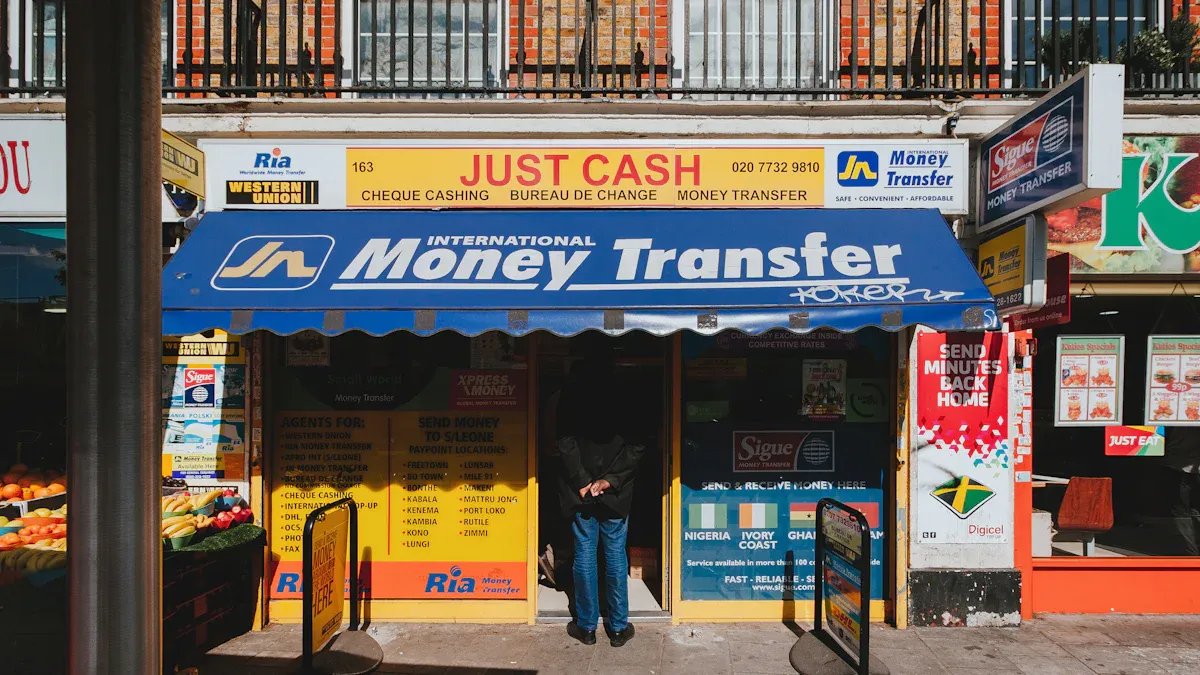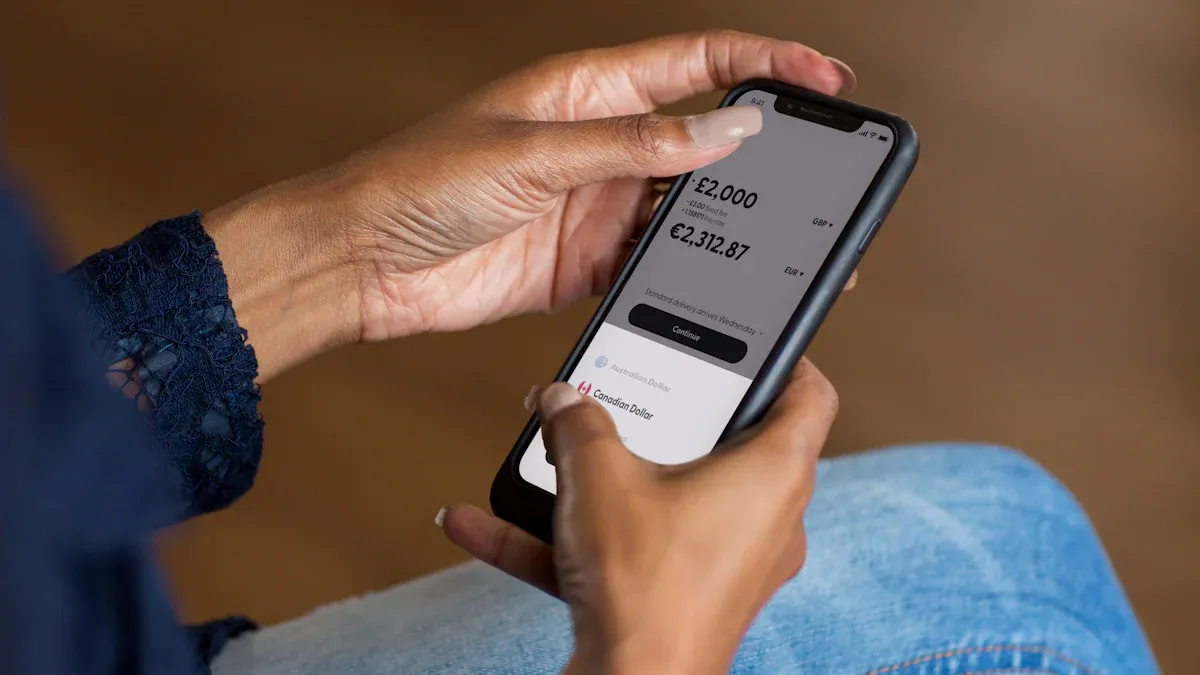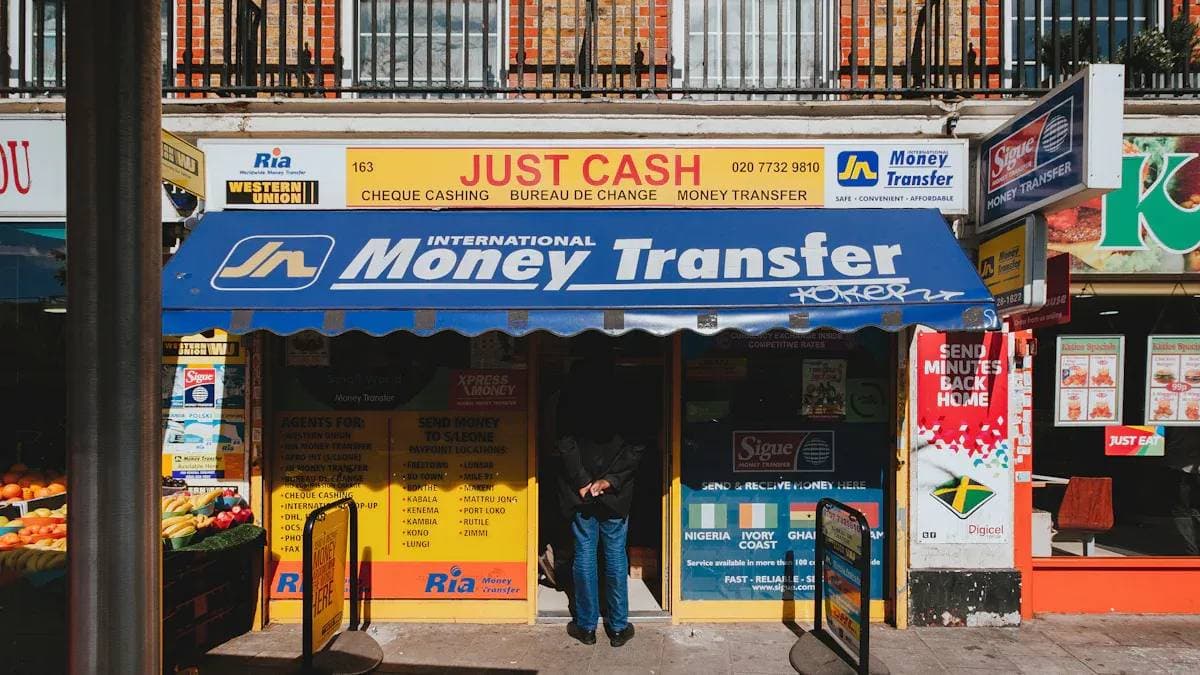- EasyCard
- Trade
- Help
- Announcement
- Academy
- SWIFT Code
- Iban Number
- Referral
- Customer Service
- Blog
- Creator
International Remittance Security and Convenience Rankings: Helping You Choose the Right Tool

Image Source: unsplash
When choosing an international remittance tool, you are most concerned about security and convenience. Bank wire transfers (such as Hong Kong banks), Wise, PayPal, Western Union, and others each have their core advantages. The rankings are based on dimensions like security, convenience, fees (in USD), and delivery speed. You can select the most suitable remittance method based on your actual needs.
Key Points
- When choosing an international remittance tool, security is the primary consideration, with bank wire transfers and major remittance apps offering the highest assurance.
- Convenience impacts the remittance experience, with apps like Wise and PayPal being user-friendly and suitable for daily small transfers.
- Fee differences are significant, and low-fee, transparent exchange rate apps are recommended for frequent small remittances.
- Delivery speed determines fund usage efficiency, with Western Union, MoneyGram, or real-time platforms ideal for urgent needs.
- Choose rationally based on amount, delivery speed, and receiving method, while verifying information and preventing fraud to ensure fund safety.
International Remittance Rankings

Image Source: unsplash
Rankings Overview
When choosing an international remittance method, you can refer to the top five mainstream methods in the U.S.:
- Check: Suitable for small transfers, free, and provides written proof.
- ACH Transfer (Electronic Fund Transfer): Automated clearing for regular transfers, but with amount and frequency limits.
- Peer-to-Peer Transfer: Such as PayPal or Venmo, with fast transfer speeds and convenient operations, ideal for small payments.
- Wire Transfer: Conducted through banks (e.g., Hong Kong banks), suitable for large and cross-border remittances, with fast delivery but high fees and non-revocable.
- Third-Party Remittance Services: Such as Western Union or Wise, supporting cross-border cash or account transfers, convenient for users without bank accounts, but with higher fees and amount limits.
Core Advantages
When choosing an international remittance tool, you need to focus on security and convenience. Different methods have their pros and cons. The table below helps you compare quickly:
| Remittance Method | Security Features | Convenience Features | Main Drawbacks |
|---|---|---|---|
| Bank Transfer | High security | Traditional method, relatively complex operations | High fees, less favorable exchange rates |
| Online Payment Platforms | Requires account registration and bank card linking, good security | Convenient and fast, low fees | Requires internet, high account management requirements |
| Remittance Services (e.g., Western Union, Wise) | Reliable, extensive network, fast | Fast, broad coverage | Higher fees and charges |
| Prepaid Cards | Good security, replaceable if lost | Easy to use | Usage fees and exchange rate fluctuation risks |
You can see that bank transfers (e.g., Hong Kong banks) are suitable for large international remittances, offering high security but higher fees. Online payment platforms like PayPal are ideal for small, daily international remittances, with simple operations and fast delivery. Third-party services like Western Union and Wise are suitable for those without bank accounts, supporting cash pickup, but with higher fees. Prepaid cards like Vanilla Gift Card can also be used for international remittances, offering security and convenience, but you should be cautious of exchange rate changes and fraud risks.
Evaluation Criteria
When choosing an international remittance tool, you need to consider four core criteria: security, convenience, fees, and delivery speed. Different users and scenarios prioritize these criteria differently. For example, businesses prioritize security and compliance for large remittances, while individuals focus on ease of operation and timely delivery.
Security
When conducting international remittances, security is the most critical factor. Bank wire transfers (e.g., Hong Kong banks) typically use multi-factor authentication and encryption to effectively protect your funds. Major remittance apps and third-party platforms also prevent fraud through account linking and transaction monitoring. You should prioritize platforms with strong reputations and compliance credentials. For large remittances, bank channels are recommended for lower risk.
Convenience
Convenience directly impacts your remittance experience. You can complete international remittances via mobile apps, websites, or offline branches. Platforms like Wise and PayPal support online operations with user-friendly interfaces, ideal for daily small remittances. Bank wire transfers, while secure, involve more procedures, suitable for large, non-urgent funds. Western Union and MoneyGram support cash pickup, ideal for users without bank accounts. You should choose the most convenient method based on your needs.
Fees
Fees are another key factor to consider. Bank wire transfers typically charge high fees (e.g., $20-50 per transaction) and may involve exchange rate margins. Apps like Wise offer low, transparent fees with mid-market exchange rates, ideal for frequent small remittances. PayPal and Western Union remittance fees are higher, especially for cross-border cash remittances. You should compare fee structures across platforms and make decisions based on remittance amount and frequency.
Delivery Speed
Delivery speed affects your fund planning. According to Ping An Bank and Remitly, international remittance delivery times range from minutes to several business days. Real-time payment systems (e.g., RTGS between Shenzhen and Hong Kong) enable instant delivery for HKD and USD, ideal for urgent needs. Credit card payments are usually faster but have higher fees. Bank transfers are slower, affected by remittance processes and receiving bank efficiency. You should choose based on the urgency of the funds.
Tip: For large, urgent remittances, prioritize real-time delivery or transparent-fee platforms; for daily small remittances, choose convenient, low-fee apps.
International Remittance Methods

Image Source: unsplash
Bank Wire Transfer
When choosing a bank wire transfer, you typically prioritize security. Financial institutions like Hong Kong banks require you to provide accurate remitter information, including name, address, and account number. This information is fully transmitted through the payment chain. Banks strictly review and monitor transfers lacking complete information. Financial regulators in various countries can block or restrict funds suspected of terrorism financing or money laundering. Banks also penalize false declarations and strengthen international cooperation to prevent illegal fund flows. When processing international remittances through Hong Kong banks, they use enterprise-grade security technologies to protect your funds and information. You can access 24/7 customer support services for enhanced security assurance.
Bank wire transfers are suitable for large international remittances. You need to provide detailed recipient information, and the process involves multiple steps. Fees are generally high, around $20-50 per transaction, with potential exchange rate margins. Delivery typically takes 1-3 business days, though some real-time systems enable instant delivery. Bank wire transfers are ideal for businesses, cross-border trade, and large fund transfers.
Tip: For largeinternational remittances, prioritize bank wire transfers to ensure fund security and compliance.
Remittance Apps
If you prioritize convenience and low fees, you can choose remittance apps like Wise or Remitly. These apps support multiple payment methods, including bank transfers, debit cards, credit cards, Apple Pay, and Google Pay. You can quickly register via mobile, with simple operations. Wise uses mid-market exchange rates without hidden margins, with low and transparent fees. When remitting, fees are displayed separately, not hidden in the exchange rate. Delivery is fast, with some countries achieving transfers in seconds. Wise supports multiple receiving methods, including Wise accounts, UnionPay cards, Alipay, and WeChat, suitable for individual users and freelancers.
| App | Fee Advantage | Exchange Rate Advantage | Delivery Speed | Payment Methods | Receiving Methods | Registration Convenience |
|---|---|---|---|---|---|---|
| Wise | Low and transparent fees | Mid-market exchange rate | Seconds to delivery | Bank transfer, debit card, credit card, etc. | Wise account, UnionPay, Alipay, WeChat | Quick mobile registration |
| Western Union | Relatively high fees | Exchange rate with margin | Real-time delivery | Electronic channels, diverse agent payment methods | Cash, Alipay, WeChat, direct deposit | Requires address proof, slightly higher threshold |
Wise achieves fast transfers through local bank accounts, avoiding delays from traditional bank intermediaries, improving delivery speed and efficiency. When using remittance apps, you can track progress in real-time, enhancing convenience.
PayPal
When using PayPal for international remittances, you can benefit from multiple security measures. PayPal requires you to complete identity verification, linking a bank account or credit card to increase transaction limits and reduce fraud risks. The platform uses encryption to protect your funds and personal information. PayPal offers buyer and seller protection policies, handling fraud, disputes, and refunds to ensure fund safety. The platform monitors payment statuses, chargebacks, refunds, and disputes, promptly addressing suspicious transactions.
- PayPal’s verification process confirms your identity, enhancing platform security.
- After verification, you can enjoy higher transaction limits.
- Verification reduces account restrictions, increasing fund operation flexibility.
- Verification helps protect your account from unauthorized access and fraud.
PayPal is suitable for small international remittances and daily consumption. You can transfer funds via email or phone number, with simple operations. Fees are relatively high, especially for cross-border transactions, with noticeable fees and exchange rate margins. Delivery is fast, typically completed in minutes.
Western Union
If you lack a bank account or need cash pickup, you can choose Western Union. Western Union has a vast global agent network, covering over 200 countries and regions. After remitting, the recipient can collect cash at any authorized agent with a transfer reference number and valid ID. Western Union supports multiple receiving methods, including cash pickup, direct bank deposits, and prepaid card loading, meeting diverse user needs. The receiving process is fast, secure, and reliable. You can track fund status in real-time using the transfer tracking number, enhancing security.
Western Union is suitable for urgent cash needs and users without bank accounts. Fees are high, with noticeable charges for some payment methods. Exchange rates are less transparent than Wise, with margins. When receiving funds in China or other countries, you can choose the nearest agent for quick cash pickup.
MoneyGram
When choosing MoneyGram for international remittances, you can enjoy global coverage and diverse receiving methods. MoneyGram supports cash pickup, bank deposits, and mobile wallet top-ups. You provide recipient information and a transfer reference number, and the recipient can collect cash at any global agent. MoneyGram is suitable for users without bank accounts or needing quick cash access. Fees are high, with fast delivery, typically completed in minutes. You can remit via online or offline channels, flexibly choosing payment methods.
P2P Platforms
If you consider P2P platforms for international remittances, you need to be aware of security risks. P2P platforms primarily face technical and credit risks. Platform systems are vulnerable to internet security issues and hacker attacks. Insufficient borrower credit checks may lead to repayment defaults. Frequent changes in fund custody increase security risks. P2P platforms also face issues like illegal fundraising, lax information reviews, and inadequate fund oversight. When blockchain technology is used in P2P remittances, issues like poor interoperability, insufficient privacy protection, and code vulnerabilities are prominent. Blockchain lacks comprehensive international and national regulations, limiting its widespread use. When choosing P2P platforms, you should pay special attention to platform credentials and fund safety.
- Technical Risk: Platform systems are prone to hacker attacks and security vulnerabilities.
- Credit Risk: Inadequate borrower reviews may lead to repayment defaults.
- Fund Custody Risk: Frequent changes in custody institutions increase fund safety risks.
- Illegal Fundraising Risk: Some platforms face accountability for illegal public deposit absorption.
- Blockchain Risk: Issues like poor interoperability, insufficient privacy protection, and code vulnerabilities are prominent.
P2P platforms are suitable for small, non-urgent international remittances. You should exercise caution when using them to avoid fund losses due to platform risks.
Offline and Online Methods
When conducting international remittances, you can choose offline or online methods. Offline methods, such as bank counters or wire transfer agents, offer high security but involve complex procedures and longer processing times. You need to visit branches, fill out forms, and submit identity proof. Online methods, like remittance apps and PayPal, are convenient, supporting mobile and computer operations. You can complete remittances anytime, anywhere, and track progress in real-time. Online methods are suitable for daily small remittances and urgent needs, while offline methods are ideal for large funds and cash pickup scenarios.
Reminder: When choosing an international remittance method, weigh security, convenience, fees, and delivery speed based on your needs to select the most suitable tool.
Method Comparison
Security Comparison
When choosing an international remittance method, security is the top consideration. Bank wire transfers (e.g., Hong Kong banks) use multi-factor authentication and encryption to effectively prevent fund theft. Remittance apps like Wise and PayPal have strict account verification and transaction monitoring. Western Union and MoneyGram rely on global networks and identity checks to ensure secure cash pickup. P2P platforms have lower security, vulnerable to hacker attacks and credit risks. Offline methods like bank counters offer high security but are operationally complex.
| Remittance Method | Security Level | Main Security Measures |
|---|---|---|
| Bank Wire Transfer | Very High | Multi-factor authentication, encryption, regulatory compliance |
| Remittance Apps | High | Account linking, transaction monitoring, encryption |
| PayPal | High | Identity verification, buyer/seller protection, encryption |
| Western Union/MoneyGram | Moderately High | Identity checks, global network, cash tracking |
| P2P Platforms | Low | Limited technical protection, lax credit reviews |
| Offline Counter | Very High | In-person verification, manual reviews |
If you need to transfer large funds, prioritize bank wire transfers or major remittance apps to maximize fund safety.
Convenience Comparison
Convenience directly impacts your remittance experience. When using remittance apps (e.g., Wise, PayPal), you can complete operations in minutes via mobile or computer. Bank wire transfers involve more procedures, requiring detailed information, suitable for non-urgent scenarios. Western Union and MoneyGram support both online and offline operations, with convenient cash pickup. P2P platforms are simple to operate but carry higher risks. Book transfers support 24/7 delivery, ideal for users needing anytime transfers. Other channels like CNAPS, Hong Kong RTGS, and CIPS have time restrictions, with potential delays during holidays.
| Remittance Method | Operational Convenience | 24/7 Delivery Support | Notes |
|---|---|---|---|
| Remittance Apps | Very Convenient | Partial Support | Mobile operations, real-time delivery |
| Bank Wire Transfer | Moderate | No | Requires detailed information, more steps |
| PayPal | Very Convenient | Partial Support | Link email or phone number |
| Western Union/MoneyGram | Convenient | No | Requires branch or online operations |
| P2P Platforms | Very Convenient | No | Simple operations, higher risks |
| Book Transfer | Very Convenient | Yes | 24/7 clearing |
If you prioritize anytime delivery and simplicity, consider book transfers and mainstream remittance apps.
Fee Comparison
When conducting international remittances, fees directly impact your costs. Bank wire transfers have the highest fees, typically $20-50 per transaction, with additional exchange rate margins. Apps like Wise offer low, transparent fees with mid-market exchange rates. PayPal and Western Union have higher fees, especially for cross-border cash remittances. P2P platforms have low fees but lack security. Offline counter services may incur additional service fees.
| Remittance Method | Fee Level (USD) | Exchange Rate Transparency | Notes |
|---|---|---|---|
| Bank Wire Transfer | 20-50 | Moderate | Includes exchange rate margins |
| Remittance Apps | Low | High | Transparent fees and rates |
| PayPal | High | Moderate | Noticeable cross-border fees |
| Western Union/MoneyGram | High | Moderate | High cash pickup fees |
| P2P Platforms | Low | Moderate | High risk, low fees |
| Offline Counter | Moderate | Moderate | Possible additional service fees |
For frequent small remittances, choose low-fee, transparent-rate apps for cost savings.
Delivery Speed Comparison
Delivery speed determines how quickly you can access funds. Remittance apps and PayPal typically deliver in minutes, ideal for urgent needs. Bank wire transfers take 1-3 business days, though real-time systems (e.g., Hong Kong RTGS) enable same-day delivery. Western Union and MoneyGram support real-time cash pickup. Book transfers offer 24/7 delivery, highly efficient. P2P platform delivery is unstable, affected by platform reviews and recipient actions.
| Remittance Method | Delivery Speed | Suitable Scenarios |
|---|---|---|
| Remittance Apps | Seconds to Hours | Daily, urgent, small amounts |
| Bank Wire Transfer | 1-3 Business Days | Large, trade, business |
| PayPal | Minutes | Small, consumption, personal |
| Western Union/MoneyGram | Minutes | Cash pickup, urgent |
| P2P Platforms | Unstable | Small, non-urgent |
| Book Transfer | Real-Time | Same-bank accounts, anytime needs |
For fast fund delivery, prioritize remittance apps, PayPal, or book transfers.
Applicable Scenario Comparison
Different international remittance methods suit different scenarios. You can choose the best tool based on your needs.
- Education Industry: You can use platforms like PayEase to pay tuition, suitable for study abroad and education project settlements.
- Cross-Border E-Commerce: If you run an e-commerce business, choose one-stop cross-border payment services for fast, secure fund flows.
- Overseas Fund Receipt: In scenarios like international trade, tourism, conferences, or donations, you can use various international credit card payments, which are convenient with strict risk controls.
- Conferences and Exhibitions: For conference and exhibition activities, you can use customized payment solutions to reduce transaction costs and improve efficiency.
- Large Trade: For large fund transfers, bank wire transfers are the most secure and compliant.
- Cash Pickup: If you lack a bank account, Western Union and MoneyGram support global cash pickup.
- Daily Small Remittances: You can use Wise, PayPal, or similar apps for simple operations and fast delivery.
IBAN and SWIFT/BIC codes are critical in cross-border remittances. IBAN ensures accurate account information, and SWIFT/BIC identifies banks. When remitting to different countries, you must provide accurate account information per local requirements.
Selection Recommendations
Large Remittances
If you need large international remittances, such as paying tuition or cross-border trade, prioritize bank wire transfers. Large banks like Hong Kong banks use multi-factor authentication and encryption to ensure fund safety. You need to prepare detailed recipient information. Bank wire transfer fees are typically $20-50, with delivery in 1-3 business days. You can consult Hong Kong banks for real-time delivery services, with some systems supporting same-day delivery. For large remittances, banks strictly verify fund sources to ensure compliance.
Small/Daily Remittances
For daily small international remittances, such as sending living expenses to family or paying for overseas shopping, use apps like Wise or PayPal. These platforms are user-friendly, supporting mobile and computer operations. Wise uses mid-market exchange rates with low, transparent fees. PayPal is suitable for small consumption with fast delivery. You can track remittance progress anytime, facilitating fund management.
Urgent Needs
In urgent situations, such as family members needing funds overseas, choose Western Union or MoneyGram. These methods support global real-time cash pickup. You provide recipient information and a transfer reference number, and the recipient can collect cash in minutes. Fees are high, but delivery is fast, ideal for emergencies.
Cash Pickup
If you or the recipient lack a bank account and can only receive cash, Western Union and MoneyGram are good options. You can process remittances at global agents, and the recipient collects cash with an ID and reference number. You should keep transfer receipts safe to avoid information leaks.
Risk Prevention
When choosing an international remittance tool, pay special attention to security and compliance. Verify platform credentials and prioritize reputable providers. Avoid clicking remittance links from strangers to prevent fraud. Double-check recipient information to avoid losses due to errors. Protect personal information and avoid sharing account details or passwords.
Tip: For international remittances, regularly update passwords and enable two-factor authentication to enhance account security.
You can use the rankings and comparisons to clarify your amount needs, delivery speed, and receiving method. When choosing an international remittance tool, rationally analyze security, convenience, and fees. Pay attention to compliance and risk prevention. This way, you can complete international remittances more efficiently and securely.
FAQ
How do I choose the most suitable international remittance method?
You can choose based on amount, delivery speed, and receiving method. For large amounts, use Hong Kong bank wire transfers; for small or daily remittances, use Wise or PayPal. For urgent cash needs, Western Union and MoneyGram are more convenient.
What information does the recipient need to prepare for remittances to China?
You need the recipient to provide their name, bank account number, bank details (e.g., Hong Kong bank), and SWIFT/BIC code. Some platforms also require recipient identity proof. Accurate information prevents delays or failures.
How much are remittance fees, and how are they calculated?
Fees vary by method. Hong Kong bank wire transfers cost about $20-50 per transaction, while Wise offers low, transparent fees. You can enter the amount on the platform’s website, and the system will calculate total fees and exchange rates.
How long does an international remittance take to arrive?
Delivery time depends on the method. Wise and PayPal typically deliver in minutes, Hong Kong bank wire transfers take 1-3 business days, and Western Union/MoneyGram cash pickups are completed in minutes. Holidays may cause delays.
How can I prevent international remittance fraud?
Verify recipient information and avoid clicking unknown links. Choose reputable platforms like Hong Kong banks or Wise. Enable two-factor authentication for account security. Contact customer support immediately for any anomalies.
After a detailed comparison of Wise and PayPal/Xoom’s remittance services, you will find that while each has its strengths, neither can fully meet your needs for cost, speed, and flexibility. Wise offers fee transparency but its delivery speed can be inconsistent, while PayPal/Xoom is fast but its exchange rates contain hidden costs. To solve this dilemma, BiyaPay offers a superior solution. We not only provide remittance fees as low as 0.5%, significantly reducing your costs, but also support same-day delivery to most countries and regions worldwide, completely revolutionizing your cross-border remittance experience. Our platform supports the conversion between various fiat and digital currencies and provides a real-time exchange rate converter, allowing you to easily manage your global assets on a single platform. Say goodbye to the difficult choice, and register now to start your new journey in smart finance.
*This article is provided for general information purposes and does not constitute legal, tax or other professional advice from BiyaPay or its subsidiaries and its affiliates, and it is not intended as a substitute for obtaining advice from a financial advisor or any other professional.
We make no representations, warranties or warranties, express or implied, as to the accuracy, completeness or timeliness of the contents of this publication.




Contact Us
Company and Team
BiyaPay Products
Customer Services
is a broker-dealer registered with the U.S. Securities and Exchange Commission (SEC) (No.: 802-127417), member of the Financial Industry Regulatory Authority (FINRA) (CRD: 325027), member of the Securities Investor Protection Corporation (SIPC), and regulated by FINRA and SEC.
registered with the US Financial Crimes Enforcement Network (FinCEN), as a Money Services Business (MSB), registration number: 31000218637349, and regulated by FinCEN.
registered as Financial Service Provider (FSP number: FSP1007221) in New Zealand, and is a member of the Financial Dispute Resolution Scheme, a New Zealand independent dispute resolution service provider.



















